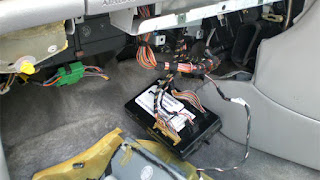Modern
cars' ability to function properly depends on a sophisticated communication
network. A variety of terminals, wires, and sensors are present in this
network, and they all provide feedback to various electronic computer modules.
The majority of the time, each of a car's critical systems has a computer
module that controls it.
The
BCM, or body control module, is one such module that is present on almost all
modern automobiles. This module is responsible for a number of safety and
comfort-related functions that are of great value to the driver and other
occupants of a vehicle.
A
vehicle's body control module, while uncommon, might experience significant
operating problems, including total failure. Several unsettling symptoms may
appear when this happens, many of which can be very unsettling to deal with. It
is advised that as soon as you notice any of the following symptoms, you
schedule your vehicle with a car
repairs near me garage as soon as you can to allow the
mechanic to identify and resolve the problem.
Learn
more about the symptoms of body control module failure in the upcoming
sections, as well as what to do if you experience any of these problems in the
future.
Failure
of the body control module is accompanied by a range of symptoms. However, some
of these signs are usually much more common than others, so it's crucial to
become familiar with them all in case you ever encounter a problem of this
nature again.
Some
of the most typical signs of a failing body control module include the ones
listed below:
1.
Excessive Battery Drainage
-
Sometimes referred to as a parasitic draw, is one of the signs of body control
module failure that is most frequently experienced. Although a limited amount
of parasitic draw is allowed, excessive draw made possible by a BCM malfunction
can quickly drain a battery. When a BCM keeps providing power to a certain
accessory at the wrong times, this draw happens. If the battery is drained
during a MOT test, you run the danger of the MOT failing since the MOT tester
might not be able to do all the tests required to pass the MOT test. Therefore,
check MOT
status of your vehicle and have this problem addressed.
2.
Erratic Electrical
Function –
A damaged body control module can also lead to sporadic performance of a number
of electrical features, including the horn, lights, and wipers of a car. You
run the danger of a failing if these components don't function properly because
they are tested during a MOT. To properly investigate and address the issue,
you need schedule an appointment with a competent mechanic at one of the car garages in Reading
you find online. Unusual door lock and radio operation are additional
warning signs of body control module failure, as are dials in the instrument
cluster that sweep erratically. When more than one of these symptoms is present
at any particular period, the likelihood that such problems are BCM-related
rises.
3.
Security System Issues - The body control
module nearly always controls the security system in a vehicle. Therefore, it
is simple to conclude that recurring yet mysterious security system problems
with vehicles are a result of a broken or malfunctioning body control module.
Problems with a vehicle's keyless entry or passive entry systems can also fall
under this category.
4.
Dashboard Warning
Lights - The
instrument cluster of a car might suffer greatly from a malfunctioning body
control module. Unremarkable dash displays might suddenly become incredibly
lit, almost like a Christmas tree. This happens when one or more of a vehicle's
extra control modules, such as the airbag control module, powertrain control
module, or transmission control module, are unable to interact with a BCM. If
any warning lights are on your dashboard, you should look online for garages in Reading so
that a technician may examine your vehicle, identify the issue, and make any
necessary repairs.
5.
Failure To Start - In some circumstances, a
malfunctioning or damaged body control module may also prohibit a vehicle from
starting at all. Even though it happens infrequently, a malfunctioning BCM can
inhibit starter engagement by failing to recognise the transponder chip in the
key or by simply failing to provide a "start" signal from the
ignition switch. Inability of the BCM to communicate with other associated
control modules can also cause problems starting the engine.
Is a Bad BCM Safe to Drive With?
It
is generally not recommended to drive a car with a damaged body control module,
even though it is hypothetically possible to do so. This is due to the
unpredictability of a computer module that is about to break.
Simply
said, it is impossible to foresee which of a malfunctioning computer's features
will work as intended at any given time. The issue with this is that it is
impossible to predict whether a BCM failure will lead to a safety-sensitive
issue or not.
There
is no assurance that a malfunctioning BCM would turn on a vehicle's lights,
when necessary, even if nothing similar has ever happened in the past. The
occupants of a vehicle are put at a reasonable risk by this.

Comments
Post a Comment